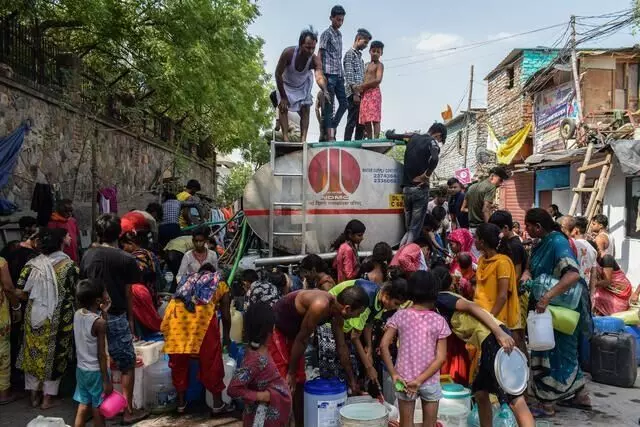
Delhi's Water Crisis: The Struggle for a Reliable Supply Amidst Urban Challenges
As temperatures soar to 49°C, Delhi faces a severe water crisis, with residents enduring long queues under the scorching sun for a few litres of water. Despite efforts like the new wastewater treatment plant, access to clean drinking water remains a challenge.
As the scorching summer sun beats down on the national capital, Delhi, temperatures have soared to an unprecedented 49 degrees Celsius. Amidst this extreme heat, a severe water crisis has gripped the city, prompting the Supreme Court to intervene on Thursday. The court permitted Himachal Pradesh to release 137 cusecs of its surplus water. It directed the Haryana government to ensure that this water flows uninterrupted from the Hathnikund barrage to Wazirabad in Delhi, aiming to alleviate the drinking water shortage in the capital.
Residents are forced to stand in long queues under the scorching sun, clutching empty buckets in a desperate attempt to secure even a few precious litres of water. While the challenge is widespread all over the city, its severity is acutely felt in Okhla, a locality within the East Delhi parliamentary constituency, characterised by its predominantly Muslim population.
Okhla has witnessed rapid urbanisation in recent years, with the proliferation of residential buildings and commercial establishments crowding its narrow streets. In this densely populated area, where households are often stacked atop one another, the shortage of water and frequent power outages have become distressingly commonplace. The streets, once vibrant with activity, now bear witness to a gloomy sight of overflowing garbage, choked drains, and irregular water supply—a potent reminder of the region's pressing infrastructural challenges.
Against this backdrop of urban decay, the residents of Okhla grapple with many interconnected issues, from poorly maintained traffic to inadequate sewage infrastructure. However, the scarcity of water looms largest in their daily lives, magnifying concerns related to employment, education, health, and familial relations.
One of the residents, Rubeena Khaņ, a resident of Noor Nagar, Okhla, says that water pipes have been installed, but the supply is erratic. "Living here for five years, I've seen a severe lack of clean water and basic amenities. Some days, we don't receive water for 24 hours, making daily tasks like cooking and bathing difficult. Recently, we haven't had clean drinking water for two days because the local plant isn't working, forcing us to buy packaged water, which is comparatively costly."
The irregular water supply through pipelines has fueled a burgeoning demand for water tankers across the capital, increasing the plight of Okhla's residents who find themselves at the mercy of an unreliable and often insufficient water supply.
"It disrupts everything. Without water, our routines are thrown into chaos. We never know when water will be available again, and relying on packaged water is expensive and unsustainable. The community is struggling and feels like basic needs have become luxuries. We need a consistent water supply and better infrastructure. Clean water shouldn't be a luxury—it's a basic right. I hope the authorities address these issues so we can live with dignity and without constant worry," she added.
In Delhi, the largest wastewater treatment plant in Okhla has been opened. This step was done to fulfil the Delhi government's promise of cleaning the Yamuna by 2025.
This ambitious endeavour to construct Asia's largest wastewater treatment plant in Okhla signifies a significant step towards addressing the city's pressing water management challenges. With a capacity to treat 564 MLD (million litres per day) of sewage, the plant promises to provide relief to a population of 40 lakh residents by catering to a significant portion of Delhi's sewage burden. Positioned as Asia's largest wastewater treatment facility, its operation is poised to treat 15 to 20 per cent of the capital's sewage output.
Crucially, the plant's innovative design incorporates sustainable practices focusing on energy efficiency and resource utilisation. By harnessing biogas derived from sewage sludge, the plant can generate 4.8 megawatts of electricity, fulfilling half of its energy requirements through green energy production. Furthermore, using waste-to-energy technologies underscores the facility's commitment to maximising resource efficiency while minimising environmental impact. Beyond electricity generation, the treated water, boasting a significantly reduced Biochemical Oxygen Demand (BOD), holds promise for various non-potable uses, including gardening and industrial applications.
However, despite these commendable efforts, the ground reality paints a starkly different picture for residents like Shehzad of Okhla Vihar, who share the pervasive sense of disillusionment among the community. "I don't need the water for gardening; I need it to drink. Why is the government not doing anything about that? The water treatment plant will only be useful if it provides us with clean drinking water," says Shehzad of Okhla Vihar, who lives with a family of five. Shehzad highlights residents' daily struggles due to unreliable water supply, emphasising that access to clean drinking water is necessary for their basic needs to be met despite a water treatment facility.
Shehzad's problem highlights the stark disparity between infrastructural development and the basic needs of marginalised communities, highlighting the urgent imperative for equitable access to safe and reliable drinking water.
Compounding the challenge is the recent revelation by Delhi Jal Board (DJB) officials regarding the plummeting water levels in the Yamuna River, exacerbated by power failures at treatment facilities. This revelation highlights the instability of Delhi's water supply infrastructure, particularly during peak summer months when demand surges and resources dwindle. Furthermore, the perennial dispute between Delhi and Haryana over water allocation adds a layer of complexity to the situation, exacerbating the vulnerabilities of the capital's water supply system.
The construction of Asia's largest wastewater treatment plant in Okhla is a significant step towards better water management in Delhi. However, its success depends on a comprehensive strategy that tackles various challenges in the city's water system. Ensuring everyone has access to clean drinking water, strengthening defences against regional water disputes, and improving infrastructure are all crucial. These combined efforts are necessary to achieve a secure water future for all residents of the national capital.

